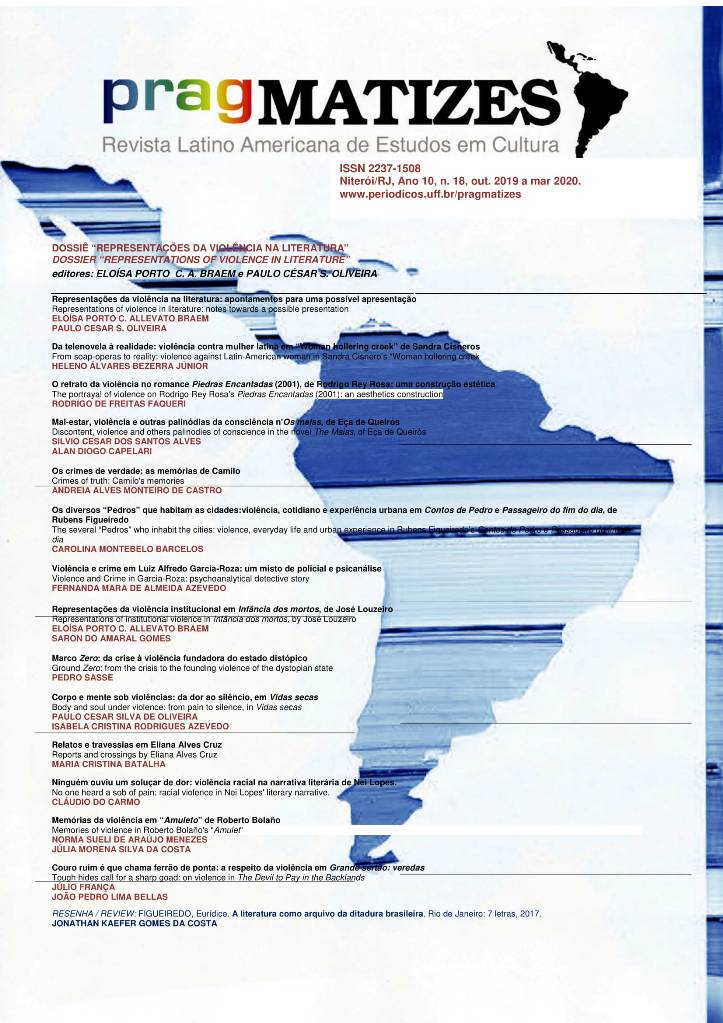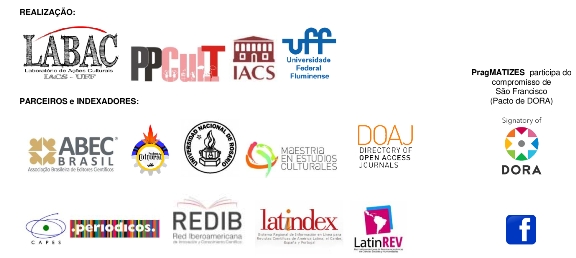Ground Zero: from the crisis to the founding violence of the dystopian state
DOI:
https://doi.org/10.22409/pragmatizes.v10i18.38766Keywords:
Dictatorship, dystopia, time, violence, totalitarianismAbstract
One of the most notorious names of the Brazilian dystopian fiction is, without doubt, Ignácio de Loyola Brandão, through Não verás país nenhum [1981], published during the military dictatorship. Recently, the author returned to the dystopian genre through Desta terra nada vai sobrar, a não ser o vento que sopra sobre ela [2018], revealing in this choice the symptom of a political atmosphere that – rather than being limited by national boundaries – joins other international manifestations such as the recent dystopian BBC series Years and Years and The Testments, an unexpected sequel for the most famous of Atwood’s dystopias, The Handmaid's Tale. With the publication of his new dystopia, Brandão identifies the ending of a trilogy started with the novel Zero. Different from the others, Zero is not, however, associated with dystopian fiction but, instead, more commonly considered a political satire of the dictatorship era – which lead to it being censored. With an assumption of the association with the dystopian novels that form the trilogy, this work aims to read Zero not by the common approaches, but rather as within the dystopian tradition, understanding it as a representation of the transition between a present crisis and a dark future that replaces it – with a transition marked both by political and physical violence.
Downloads
References
ATWOOD, Margaret. O conto da aia. Trad. Ana Deiró. Rio de Janeiro: Rocco, 2017.
BOOKER, Keith M. The dystopian impulse in modern literature: fiction as social criticism. London: Greenwood Press, 1994.
BRANDÃO, Ignácio de Loyola. Zero. 3ª ed. Rio de Janeiro: Ed. Codecri, 1979.
BURGESS, Anthony. Laranja mecânica. Trad. Fábio Fernandes. São Paulo: Aleph, 2014.
CLAEYS, Gregory. “The Origins of Dystopia: Wells, Huxley and Orwell”. In: The Cambridge Companion to Utopian Literature. Cambridge: Cambridge University Press, 2010. P. 107 - 131.
______. Dystopia: a Natural History. Oxford: Oxford University Press, 2017.
OLIVAS, Daniel A. “The Dystopia Is Here”. The New York Times, 19 junho 2018. Disponível em: https://www.nytimes.com/2018/06/19/opinion/children-separated-from-parents-border-immigrant-dystopia.html. Acesso: 21.Mar.2019.
ORWELL, George. 1984. Trad. Alexandre Hubner, Heloisa Jahn. São Paulo: Companhia das Letras, 2009.
SUVIN, Darko. Metamorphoses of Science Fiction: on the Poetics and History of a Literary Genre. New Haven e Londres: Yale University Press, 1979.
VIEIRA, Fátima. “The Concept of Utopia”. In: CLAEYS, Gregory (Org.). The Cambridge Companion to Utopian Literature. Cambridge: Cambridge University Press, 2010. P. 3 - 27.
Downloads
Published
How to Cite
Issue
Section
License
By forwarding an original to PragMATIZES, the authors agree that the copyright related to it is transferred to the Publishing. Articles and other writings are made available in PDF format from their publication, and they can be downloaded to institutional repositories and personal pages, provided that with their proper bibliographic indication.



